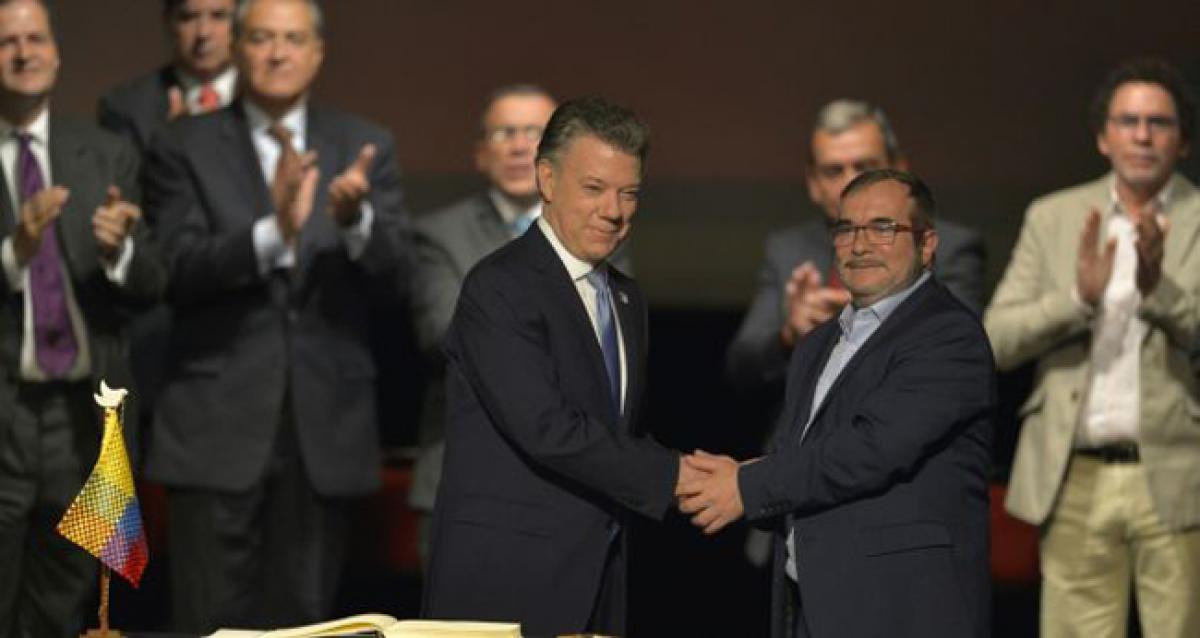Live
- Search intensified for Gowtham Reddy as HC dismisses his bail plea
- Santosh Trophy final round to begin in Hyderabad tomorrow
- BGT: Rohit must return to opening for Brisbane Test, says Ponting
- Swimming sensation Havya steals the show
- NDTL gets WADA nod to manage Athlete Biological Passport
- BWF World Tour Finals: Treesa-Gayatri wins 2nd match to keep semis hopes alive
- Youngest ever to conquer chess world
- Jamie Lever to star in Lakshmi R Iyer’s ‘2050’: It challenged me emotionally
- Prateeksha Srivastava says she seldom meets fellow music composers Rusha, Blizza, in person
- Bridal fitness tips by Yasmin Karachiwala
Just In

Colombia\'s President Juan Manuel Santos and Marxist FARC rebel leader Rodrigo Londono signed a revised peace accord on Thursday in a far more sober ceremony than a first deal rejected last month by millions at a plebiscite.As they inked the pact with a pen made from a bullet at a historic Bogota theater, onlookers chanted \"We did it!\" The new accord to end 52 years of war in Latin America\'s fourth
Colombia's President Juan Manuel Santos and Marxist FARC rebel leader Rodrigo Londono signed a revised peace accord on Thursday in a far more sober ceremony than a first deal rejected last month by millions at a plebiscite.
As they inked the pact with a pen made from a bullet at a historic Bogota theater, onlookers chanted "We did it!" The new accord to end 52 years of war in Latin America's fourth-largest economy was put together in just over a month after the original pact was narrowly and unexpectedly defeated in an October 2 referendum for being too lenient on the rebels.
The government and Revolutionary Armed Forces of Colombia (FARC) worked together in Cuba for four years to negotiate an end to the region's longest-running conflict that has killed more than 220,000 and displaced millions in the Andean nation.
"It's final!" said Santos, standing before white banners of peace and Colombia's red, yellow and blue flag "I invite you to leave decades of violence forever in the past, to unite for all of us, for Colombia, for this dear nation, and to work together for reconciliation around shared ideals of peace."
Opposition leader and former President Alvaro Uribe spearheaded the push to reject the original accord and wanted deeper changes to the new version. Opponents to the first deal are furious Santos will ratify the new deal in Congress instead of holding another vote and is urging street protests.
Santos had always promised Colombians would have the final word in a referendum, but is sidestepping that for the revised deal. After the signing, he sent the deal straight to Congress for a vote next week. The government's majority means approval is likely to be speedy.
FROM ARMS TO POLITICS
The signing ceremony marked a six-month countdown for the 7,000-strong FARC to abandon weapons and form a political party. Despite widespread relief at an end to conflict, many among Colombia's largely conservative residents are angry because, like the original agreement, the new deal will not jail FARC leaders who committed crimes like kidnappings and massacres, and it allows them to hold political office.
"As a party without weapons, the FARC can present its political project. It will be Colombians who support or reject it with a vote," said 65-year-old Santos. The understated signing in the 131-year-old Teatro Colon before mostly government and local dignitaries was a far cry from the fanfare celebration in September, where the coastal city of Cartagena hosted world leaders.
Santos, who won the Nobel Peace Prize last month for his peace efforts, wants to get the deal in place as quickly as possible to maintain a fragile bilateral ceasefire. "For the good of the nation, let us make words the only weapon Colombians are permitted to use," said Londono, 57, who is known by his nom de guerre Timochenko.
The expanded and highly complex new 310-page document makes only small modifications to the original text, such as clarifying private property rights and detailing more fully how the rebels would be confined in rural areas for crimes committed during the war. The FARC, which began as a rebellion fighting rural poverty, has battled a dozen governments as well as right-wing paramilitary groups.
An end to the war with the FARC is unlikely to end violence in Colombia as the lucrative cocaine business has given rise to criminal gangs and traffickers.

© 2024 Hyderabad Media House Limited/The Hans India. All rights reserved. Powered by hocalwire.com







